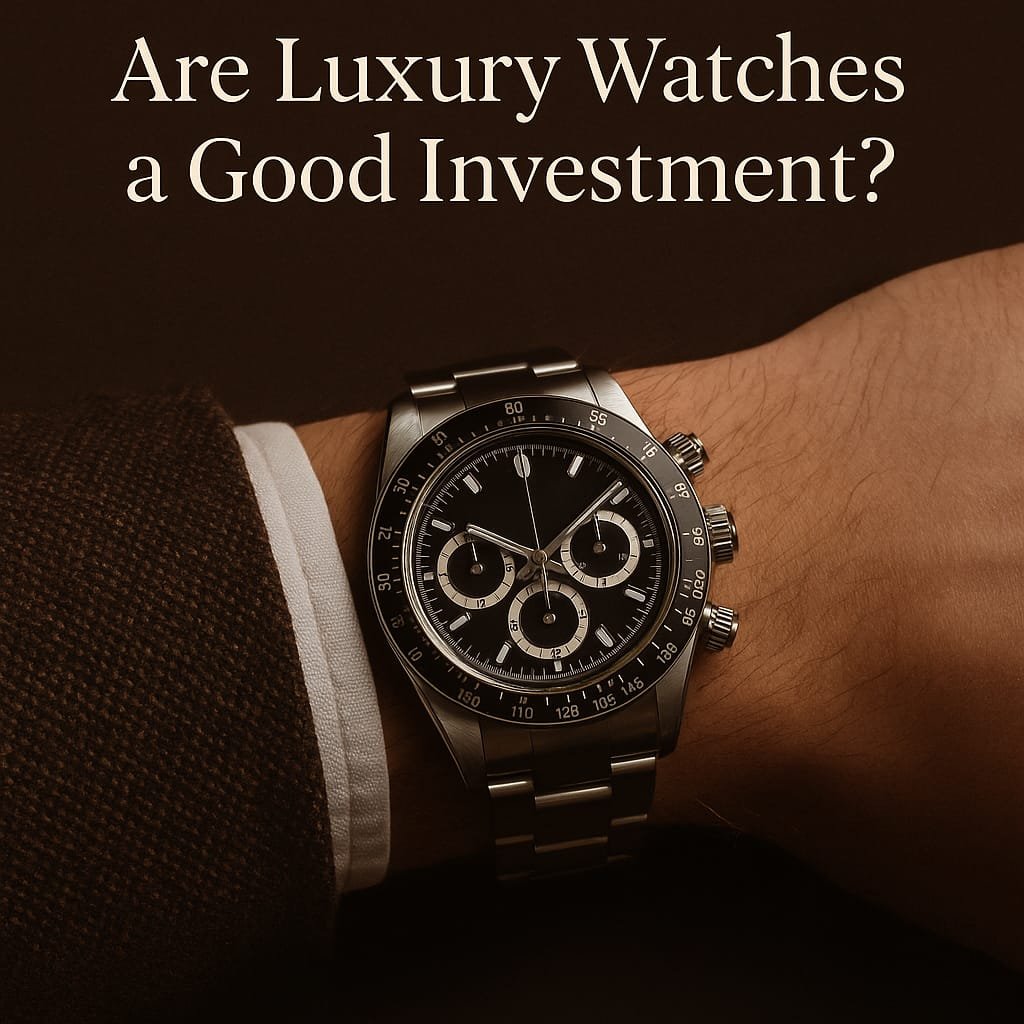Are Luxury Watches a Good Investment?
Luxury watches have long been admired for their craftsmanship, heritage, and status symbol. But in recent years, they have also caught the eye of investors looking for alternative assets beyond stocks and real estate.
This raises the important question: Are luxury watches a good investment? The answer depends on various factors, including the type of watch, market trends, brand value, and personal expectations. Let’s explore the key aspects that determine whether a luxury watch is a smart financial move or just a stylish indulgence.

1. The Appeal of Luxury Watches
Luxury watches are more than just timepieces—they’re wearable art, precision-engineered machines, and often, family heirlooms. Brands like Rolex, Patek Philippe, Audemars Piguet, and Omega are recognized globally for their reputation, rarity, and meticulous craftsmanship. These watches are made in limited quantities and often with precious materials, which adds to their exclusivity and long-term desirability.
Owning a luxury watch is seen by many as a mark of success and style. However, beyond aesthetics, collectors and investors are increasingly turning to watches as tangible assets that can hold or grow in value over time.
2. Do Watches Appreciate in Value?
While not all luxury watches increase in value, some specific models and brands do appreciate significantly over time.
Rolex Submariner, Daytona, and GMT-Master models have seen considerable appreciation in both the primary and secondary markets.
Patek Philippe’s Nautilus and Aquanaut are also known for high resale values, especially limited editions.
Watches that are discontinued, vintage, or have celebrity association often fetch higher prices over time.
For example, a steel Rolex Daytona that once retailed for under ₹6 lakhs now resells for well over ₹20 lakhs due to high demand and limited supply.
However, appreciation depends on supply and demand, market hype, rarity, condition, provenance, and overall brand strength. It’s essential to understand that not every luxury watch will be a profitable investment.
3. Factors That Influence Investment Potential
Several factors determine whether a luxury watch holds or grows in value:
Brand Reputation: Strong, historic brands like Rolex and Patek Philippe tend to perform better as investments.
Rarity & Limited Editions: Watches produced in small numbers are often more desirable.
Condition & Originality: Well-maintained watches with original parts, boxes, and papers fetch higher prices.
Historical Significance or Celebrity Ownership: These add storytelling value that boosts resale potential.
Market Trends: Like any investment, watch prices are affected by supply-demand cycles and economic conditions.
4. Risks of Investing in Watches
While the idea of profiting from a beautiful timepiece is appealing, there are risks and limitations:
Market Volatility: Watch values can fluctuate based on global demand, trends, or even currency shifts.
Liquidity: Watches are not as liquid as stocks—you may not find a buyer quickly, especially for lesser-known models.
Maintenance Costs: Luxury watches require periodic servicing, which can be expensive.
Fakes & Scams: The secondary market is filled with counterfeits. Verifying authenticity is crucial.
It’s also important to note that not all watches are investments. Many lose value after purchase, just like cars. Unless you buy wisely, hold the right model, and maintain it well, turning a profit isn’t guaranteed.
5. Watches as an Alternative Asset Class
For high-net-worth individuals and collectors, luxury watches are part of a diversified portfolio. Unlike stocks or bonds, they’re tangible assets that you can enjoy wearing while they potentially appreciate. Some even view them as “wearable wealth”—discreet, portable, and not subject to the same regulations as other investments.
Platforms and marketplaces like Chrono24, WatchBox, and Sotheby’s have made buying, selling, and valuing luxury watches more transparent. Auction houses regularly break records selling vintage and rare watches, further fueling interest in watches as investment vehicles.
6. Conclusion: Should You Invest?
So, are luxury watches a good investment? They can be—if approached with knowledge, patience, and the right strategy. High-end timepieces from established brands with strong resale history have proven their ability to hold or even increase in value. However, it’s important to view them as long-term investments, not quick-profit opportunities.
If you’re passionate about watches and plan to wear and enjoy them while watching their value potentially grow, then yes, they can be a rewarding investment—both financially and emotionally. But if you’re looking solely for high returns, other investment options may offer more predictability and liquidity.
In short, invest in luxury watches not just for profit—but for passion, heritage, and timeless beauty.

